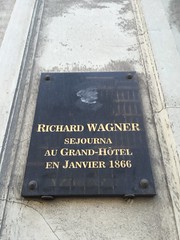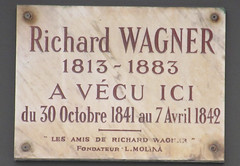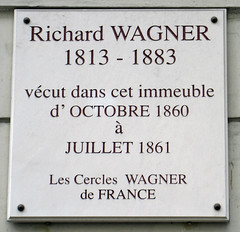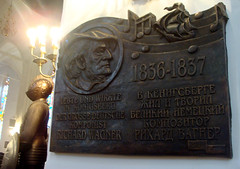Richard Wagner


Richard Wagner
(1813-1883)
Family tree
Commemorated on 8 plaques
Edward Dannreuther Musician 1844-1905 lived here 1873-1894 host to Richard Wagner for 5 weeks in 1877
12 Orme Square, London, United Kingdom where they stayed
Alte Nicolaischule 1512 als erste städtische Bürgerschule eröffnet. Bedeutende Schüler: Gottfried Wilhelm Leibniz, Christian Thomasius, Johann Gottfried Seume, Richard Wagner
English translation: Alte Nicolaishule opened in 1512 as the first municipal bail (?) school. Major students: Gottfried Wilhelm Leibniz, Christian Thomasius, Johann Gottfried Seume, Richard Wagner
Alte Nicolaischule restaurant, Nicolaikirchhof, Leipzig, Germany where they was a student
Nel 1880 Riccardo Wagner Partì di qua E a schiena d'asino andò a Ravello dove trovò per il "Parsifal" la scena del "Giardino di Klingsor" e delle "Fanciulle Fiori" (dalle cronache del tempo) Il 19 Settembre 1975 a cura della Azienda Soggiorno e Turismo di Amalfi
Hotel Lune - Via Pantaleone Comite, Atrani, Italy where they stayed (1880)
Richard Wagner séjourna au grand hôtel «en janvier 1866»
English translation: Richard Wagner stayed at the grand hotel “in January 1866” [AWS Translate]
Hôtel Noailles, Canebière, Marseille, France where they stayed (1866)
Ici Charles Baudelaire, Jean Sibelius, Richard Wagner, Oscar Wilde ont honoré Paris de leur séjovr
English translation: Here Charles Baudelaire, Jean Sibelius, Richard Wagner, Oscar Wilde have honoured Paris with their visit
19 quai Voltaire, Paris, France where they stayed
Richard Wagner, 1813-1883, a vécu ici du 30 Octobre 1841 au 7 Avril 1842.
English translation: Richard Wagner, 1813-1883, lived here from October 30, 1841 to April 7, 1842. [AWS Translate]
14 rue de Seine, Paris, France where they lived (1841-1842)
Richard Wagner, 1813 - 1883, vécut dans cet immeuble d'octobre 1860 à juillet 1861.
English translation: Richard Wagner, 1813 - 1883, lived in this building from October 1860 to July 1861. [AWS Translate]
3 rue d'Aumale, Paris, France where they lived (1860-1861)
1836-1837 Lebte und wirkte in Königsberg der groess Deutsche komponist Richard Wagner в Кёнигсберге жил и творил великий немецкий композитор Рихард Вагнер
English translation: 1836-1837 in Königsberg lived and created the great German composer Richard Wagner
Кафедральный собор (внутри), Калининград - Kaliningrad, Russia where they lived near (1835-1836)








